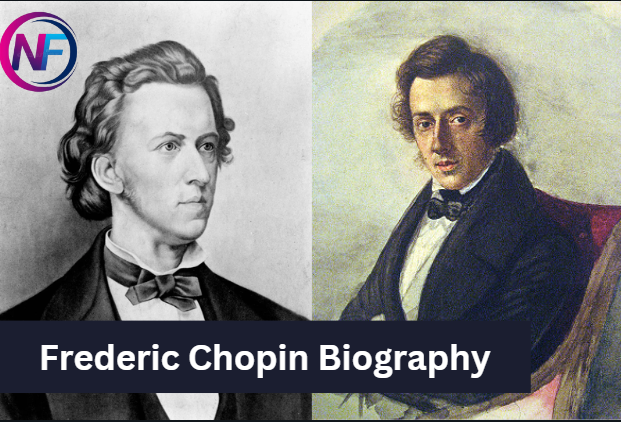
Frédéric François Chopin, a name synonymous with the Romantic period, was a composer whose music still resonates deeply today. Known for his profound genius and poetic compositions, Chopin’s works remain a staple in the world of classical music.
This article explores the life, legacy, and untimely demise of this extraordinary musician.
Frederic Chopin Biography
Who Was Frederic Chopin?
Frédéric François Chopin (born Fryderyk Franciszek Chopin) was a Polish composer and virtuoso pianist, born on March 1, 1810, in Żelazowa Wola, Poland. Widely regarded as a pioneer of the Romantic era, Chopin’s compositions for solo piano elevated the instrument’s prominence in classical music. Despite his short life of 39 years, his contributions continue to inspire musicians globally.
Early Life and Childhood
Chopin was born to Nicolas Chopin, a Frenchman, and Justyna Krzyżanowska, a Polish woman. His family moved to Warsaw shortly after his birth, where his father worked as a teacher. From an early age, Chopin demonstrated prodigious musical talent. By seven, he was already composing polonaises and performing publicly, earning the nickname “little Mozart.”
Musical Education and Talents
Chopin’s musical education began under the tutelage of Wojciech Żywny, a Czech pianist who nurtured his innate abilities. His studies continued in Warsaw, where he delved into classical compositions and Polish folk music, influences that would later define his unique style.
The Move to Paris
At the age of 20, Chopin left Poland amid political unrest, eventually settling in Paris. There, he immersed himself in the vibrant cultural scene, befriending other luminaries like Franz Liszt and Robert Schumann. Paris became his new home, where he flourished as a composer and pianist.
Chopin’s Unique Style
Chopin’s music is characterized by its emotional depth, innovative use of harmony, and technical brilliance. He drew inspiration from Polish folk dances like mazurkas and polonaises, blending them with the influences of Mozart, Bach, and Schubert. His works are celebrated for their lyrical melodies and intricate details.
Personal Relationships
Chopin’s personal life was as captivating as his music. He was briefly engaged to Maria Wodzińska but ended the relationship. Later, he shared a tumultuous romance with French novelist George Sand. Their time together in Mallorca was both creatively fruitful and personally challenging.
Health Struggles
From childhood, Chopin suffered from fragile health, including respiratory problems. These ailments intensified in adulthood, frequently hindering his ability to perform publicly. Despite his declining health, he continued composing, driven by his passion for music.
The Final Years
In his final years, Chopin’s health deteriorated further. Financial support from admirers like Jane Stirling allowed him to focus on composing. He performed less frequently but remained a beloved figure in Paris’s music scene.
Frederic Chopin Cause of Death
Chopin passed away on October 17, 1849, at the age of 39. The cause of death was pulmonary tuberculosis, a common and often fatal illness during his time. His funeral in Paris was attended by thousands, a testament to his profound impact on music and culture.
Chopin’s Legacy
Chopin’s legacy is unparalleled. His works remain central to piano repertoire, influencing countless composers and pianists. His music embodies the Romantic spirit, blending emotional depth with technical mastery.
Contributions to Music
Chopin’s contributions include:
- Creation of the instrumental ballade.
- Expansion of piano technique through etudes.
- Integration of Polish nationalism into music.
- Innovation in harmony and musical form.
Popular Works
Some of Chopin’s most beloved compositions include:
- Nocturnes, Op. 9
- “Revolutionary” Etude, Op. 10, No. 12
- Polonaise in A-flat Major, Op. 53
- Ballade No. 1 in G minor, Op. 23
- Prelude in D-flat Major, Op. 28, No. 15 (“Raindrop Prelude”)
Chopin’s Influence on Romanticism
Chopin was a trailblazer of Romanticism, infusing his compositions with personal emotion and national pride. His works broke traditional boundaries, paving the way for future generations of composers.
Memorials and Honors
Chopin’s legacy is commemorated worldwide. Notable memorials include:
- The Fryderyk Chopin Institute in Warsaw.
- The International Chopin Piano Competition.
- Monuments in Żelazowa Wola and Paris.
FAQs About Chopin
1. What is Chopin best known for?
Chopin is best known for his solo piano compositions, including nocturnes, mazurkas, and polonaises.
2. How did Chopin influence music?
Chopin expanded piano techniques and infused his music with emotional depth and innovative harmony.
3. Did Chopin marry?
No, Chopin never married, though he was engaged briefly and had a long-term relationship with George Sand.
4. What caused Chopin’s death?
Chopin died of pulmonary tuberculosis at the age of 39.
5. Where is Chopin buried?
Chopin is buried at Père Lachaise Cemetery in Paris, but his heart rests in Warsaw, Poland





